

Il futuro della mobilità: il Car sharing aziendale salirà da 2000 veicoli nel 2013 a 85.000 nel 2020, secondo Frost & Sullivan – Il Giornale delle PMI. Le soluzioni di car sharing aziendale acquisiscono sempre più importanza tra le esigenze di mobilità delle aziende, grazie all’aumento dell’attrattiva e della consapevolezza di tali offerte.
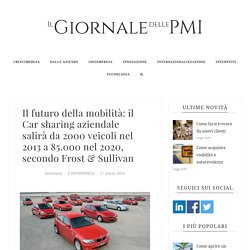
Con l’aumento della congestione e la relativa facilità di utilizzo dei trasporti pubblici nella maggior parte delle aree urbane, insieme alla crescente difficoltà di parcheggio, la necessità di avere un’auto aziendale dedicata per ciascun dipendente è, in molti casi, in diminuzione. Tutti pazzi per il carpooling (con risparmi di 1.300 euro l’anno). Ecco siti e app dove trovare un passaggio. I nomi saranno anche buffi: BlaBlaCar, Zego, Jojob, BringMe, GoGoBus.
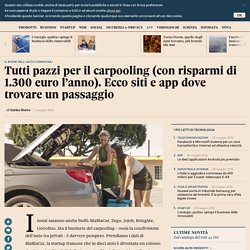
Enea definitivo3. Libro Car Sharing analisi economica e organizzativa del settore. Innovative Mobility Industry Outlook World 2016 Final. The Future of Car Sharing with Autonomous Wheels. What’s Ahead for Car Sharing? Accessibility and the sharing economy: Leap, Uber, Lyft and ADA requirements. The disruption of traditional transportation by startups like Uber and Lyft has created waves and caused many cities and agencies to re-examine how they regulate taxis and the livery system.
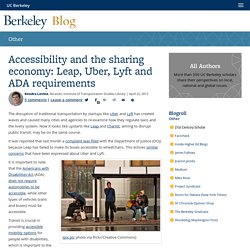
Now it looks like upstarts like Leap and Chariot, aiming to disrupt public transit, may be on the same course. It was reported that last month a complaint was filed with the Department of Justice (DOJ) because Leap has failed to make its buses accessible to wheelchairs. This echoes similar concerns that have been expressed about Uber and Lyft. (pix.plz photo via flickr/Creative Commons) It is important to note that the Americans with Disabilities Act (ADA) does not require automobiles to be accessible, while other types of vehicles (vans and buses) must be accessible. Transit is crucial in providing accessible mobility options for people with disabilities, which is important to the quality of life.
The Leap case also raises the existential question — what does it mean to be a transit service? BMW Group extends car-sharing programme and launches enhanced mobility services in Seattle under the new brand name “ReachNow” Car-sharing 2.0 offers new and innovative services BMW Group remains the driving force for individual mobility of the future Consistent implementation of the strategy NUMBER ONE > NEXT Seattle.
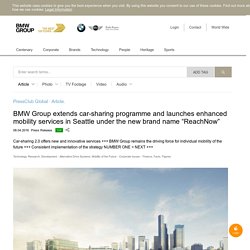
Under the new brand name “ReachNow”, BMW Group is launching an enhanced car sharing service in Seattle (USA) today. The programme is based on the successful business model currently operating in Europe under the name “DriveNow”. This move is in line with the company’s strategy NUMBER ONE > NEXT, as outlined by BMW AG Management Board Chairman Harald Krüger three weeks ago. Peter Schwarzenbauer, member of the Board of Management of BMW AG and responsible for MINI, BMW Motorrad, Rolls-Royce, After Sales and Mobility Services said at the ReachNow launch in Seattle: “We are currently witnessing an extremely exciting period in the development of the automotive industry.
ReachNow customers in the USA will be able to book the first new services in 2016: In case of queries please contact: The BMW Group. Jaguar to begin testing car sharing under new technology start-up. Jaguar Land Rover has launched a new technology business to trial solutions including car sharing and car ownership schemes across North America, Europe and Asia in the coming months.
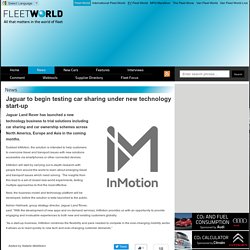
Dubbed InMotion, the solution is intended to help customers to overcome travel and transport issues with new solutions accessible via smartphones or other connected devices. InMotion will start by carrying out in-depth research with people from around the world to learn about emerging travel and transport issues which need solving. The insights from this lead to a set of closed real-world experiments, testing multiple approaches to find the most effective. Next, the business model and technology platform will be developed, before the solution is beta launched to the public. Corriere della Sera. The world’s first ad-supported car-sharing program.
LOS ANGELES, Jan. 11, 2016 /PRNewswire/ -- WaiveCar — the first car-sharing program that runs on advertising dollars, and gives drivers a break — launches today in Santa Monica and Venice Beach.
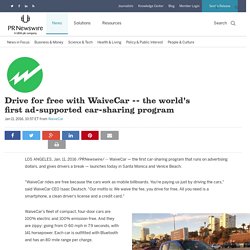
"WaiveCar rides are free because the cars work as mobile billboards. You're paying us just by driving the cars," said WaiveCar CEO Isaac Deutsch. "Our motto is: We waive the fee, you drive for free. All you need is a smartphone, a clean driver's license and a credit card. " WaiveCar's fleet of compact, four-door cars are 100% electric and 100% emission-free. Using WaiveCar's mobile app for iPhone or Android, drivers can find a car near them, book it and start driving — no cards or keys necessary.
Once your driving time is up, a map will show where you can drop off the car. Why ride-sharing makes sense for millennials and baby boomers. Consider the mobility dilemma of two people, one in the suburbs and the other in a city.
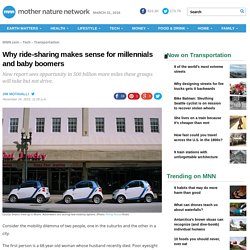
The first person is a 68-year-old woman whose husband recently died. Poor eyesight means she can’t drive anymore, so how is she going to escape being housebound in a development built around cars? The second is that same woman’s 34-year-old daughter, who grew up in the suburbs but now has a downtown apartment. She still has a car, but it’s expensive to keep in an urban garage. Because there are other choices now — from taxi disrupters Uber and Lyft, traditional car sharers like Zipcar, the personal version from Turo, and an autonomous car right around the corner — she’s thinking of going car-free. Lyft, and arch-competitor Uber, offer urban transportation options right now. Michele, 38, of Atlanta, says, “I have three children.
Arlene, 74, in Denver, agrees. Think Tank SUMC Releases Shared Mobility Guide for Cities. The Shared-Use Mobility Center (SUMC) recently released its new Shared-Use Mobility Reference Guide.
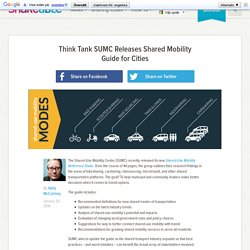
Over the course of 44 pages, the group outlines their research findings in the areas of bikesharing, carsharing, ridesourcing, microtransit, and other shared transportation platforms. The goal? To help municipal and community leaders make better decisions when it comes to transit options. The guide includes: Recommended definitions for new shared modes of transportationUpdates on the latest industry trendsAnalysis of shared-use mobility’s potential and impactsEvaluation of changing local government roles and policy choicesSuggestions for way to better connect shared-use mobility with transitRecommendations for growing shared mobility services to serve all residents SUMC aims to update the guide as the shared-transport industry expands so that best practices -- and worst mistakes -- can benefit the broad array of stakeholders involved.
Bikesharing Bikesharing is growing rapidly. SharedUseMobility ReferenceGuide 09.25. Il futuro del car-sharing è l’auto frazionata. TRB 2016: Shared Mobiliity Trends.